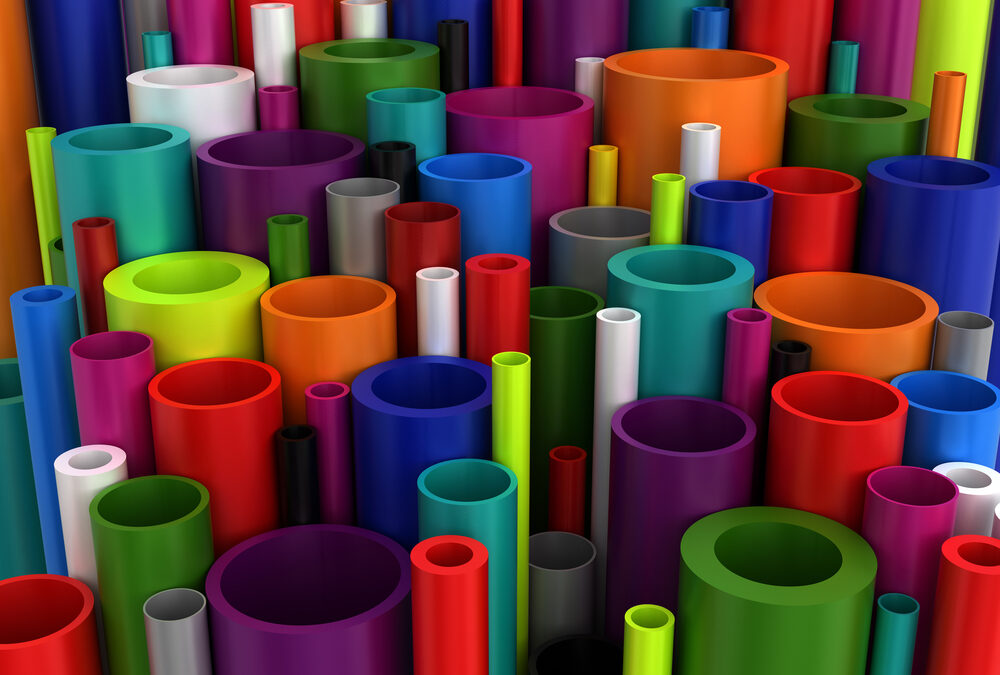Plastic, owing to its adaptability and myriad properties, has long been a keystone in modern materials science. Within the domain of plastics, custom tubing represents a specialized area where specific types of plastics are selected for precise applications based on their inherent properties. At Plastic Extrusions Technologies, we pride ourselves on understanding the intricacies of different types of plastics, especially when it comes to extruded plastic tubing. After all, it is our wheelhouse. As experts in this sector, we’ve put together a comprehensive overview of the most common types of plastics used in custom tubing so you can be well-rounded on the topic, too.
Polyvinyl Chloride (PVC)
Polyvinyl Chloride, commonly referred to as PVC, is among the most extensively utilized plastics in tubing. This vinyl tubing is well-loved for several attributes, making it a top choice for transporting various liquids in industrial settings, but the top two are its flexibility and chemical stability.
- Chemical Stability: PVC exhibits a commendable resistance to many chemicals, making it suitable for transporting a variety of substances without undergoing degradation.
- Flexibility: Depending on its formulation and treatment, PVC can range from rigid to highly flexible, catering to different tubing needs, from rigid plastic pipes to flexible plastic tubing.
Polyethylene
Polyethylene stands out for its excellent mechanical properties:
- Tensile Strength
- Chemical Resistance
With excellent tensile strength, polyethylene tubing is often used where durability is paramount. Its wall thickness can be adjusted during the extrusion process, making custom extruded plastic tubing a possibility for unique requirements. Given its resistance to a plethora of chemicals, polyethylene is a reliable choice for industries dealing with potentially harmful substances.
Polypropylene
This thermoplastic material has a knack for handling both heat and chemical interactions, making it ideal for varied industrial applications.
- Lightweight Nature: Despite its strength, polypropylene remains lightweight, which is advantageous for transport and installation.
- Thermal Stability: It can withstand higher temperatures than many other common plastics, making it valuable for applications requiring heat resistance.
Polytetrafluoroethylene (PTFE)
PTFE, while less commonly recognized by its full name -which is a mouthful to say the least- is invaluable in specialized scenarios:
- Chemical Inertia: Few substances can claim the level of chemical resistance that PTFE possesses. This makes it an essential choice for tubing that might come into contact with aggressive chemicals.
Its properties extend to being an excellent choice for pneumatic tubing, ensuring the smooth transmission of air or gases without compromise.
Other Noteworthy Materials
Beyond the major players, several other plastics and related materials play crucial roles in specific niches:
- Polyurethane: With its elastic properties, polyurethane tubing is well-suited for applications requiring both resilience and flexibility.
- Nylon: It provides a balance of strength, flexibility, and resistance to environmental factors such as UV radiation and specific chemicals.
- Silicone: Commonly utilized in medical tubing due to its biocompatibility, silicone also offers excellent flexibility and temperature resistance.
- Acrylic: Known for its clarity, it’s an ideal candidate for applications where visual monitoring of the tubing’s contents is crucial.
The Science Behind Extrusion – What PET Does Best
The transformation of raw plastic materials into custom tubing involves a process called extrusion. That’s where we come in.
Molten plastic is methodically forced through a die, enabling tubes of varying diameters and wall thicknesses to be fabricated. The precision of this process allows for diverse applications, from pneumatic tubing in industrial setups to beverage tubing in food and drink industries.
In Conclusion
The realm of plastic, with its myriad of tubing products, is as vast as it is fascinating. From the flexibility of PVC to the strength of polyethylene, each material brings its unique properties to cater to diverse needs.
At Plastic Extrusions Technologies, we take pride in our in-depth knowledge and are always poised to assist in finding the perfect match for your requirements. After all, the choice of plastic material for custom tubing isn’t arbitrary. It’s grounded in rigorous scientific principles and a deep understanding of each material’s strengths, limitations, and potential applications.
As we progress in the realm of materials science, the possibilities for plastic and its myriad applications in custom tubing continue to expand. At Plastic Extrusions Technologies, we remain at the forefront of this evolving field, dedicated to understanding, innovating, and applying the nuanced properties of these materials. Whether you’re delving into the world of beverage tubing, seeking solutions for industrial applications, or simply curious about the strength and resistance of different materials, we hope this overview has shed some light on the versatile world of plastic.

